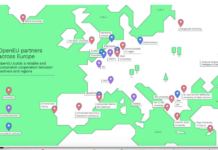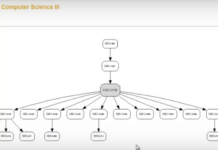Marklein, M.B. (2012) College credit for online courses gains momentum USA Today. November 13
The American Council on Education, ‘a non-profit organization that represents most of the nation’s college and university presidents‘, is to develop a process by which MOOCs can be assessed for academic rigor leading to approval for academic credit, although the decision as to whether to accept approved courses for credit transfer will still be left to the institutions.
The initiative is being funded by the Bill & Melinda Gates Foundation, and will also involve research on the impact of MOOCs.
Comment
I have mixed feelings about this. I do want to see it made easier for informal learning to be taken account of, and MOOCs do offer a low-cost way of delivering education. The issue remains though the quality of the learning experience, not the quality of the content and its academic rigor. At the least I hope the process will go beyond looking at content to include assessment and the extent to which students meet assessment requirements. In particular, what kind of knowledge is being assessed?
Second, it looks like MOOCs are being gradually ‘absorbed’ into the formal, credit system. I wonder if eventually we’ll end up back where we started, with online credit courses, but this time funded directly (or indirectly) by students and run by corporations for profit. Massive, yes; online, yes; and yes, open to those who can pay maybe a smaller fee, but with courses and programs driven by the needs of for-profit corporations, and offering a second-rate learning experience. And I hope we will see other kinds of MOOCs surviving that do not merely ape traditional education, but provide a real alternative, especially for adult learners. (Go, cMOOCs!)
At the end of the day, we need to see the business model, and especially how the teaching will be remunerated. (Am I the only one who worries about the ethics of faculty trading on the name of elite and increasingly publicly funded institutions to run a completely independent for-profit operation?) In particular, will MOOCs continue to be dependent on funding from American foundations and venture capitalists? Is this the future for public education (at least in the USA), and is this a model we want in our own countries?
MOOCs have done the easy bit so far spectacularly well: they have delivered online courses to massive numbers at low cost. But let’s remember that this is not new: radio, then television, then satellites all were able to deliver education to massive numbers, but none has survived as a serious form of education, mainly because the ‘on-the-ground’ services were essential but expensive. Now similarly hard questions are starting to be asked of MOOCs.










 Dr. Tony Bates is the author of eleven books in the field of online learning and distance education. He has provided consulting services specializing in training in the planning and management of online learning and distance education, working with over 40 organizations in 25 countries. Tony is a Research Associate with Contact North | Contact Nord, Ontario’s Distance Education & Training Network.
Dr. Tony Bates is the author of eleven books in the field of online learning and distance education. He has provided consulting services specializing in training in the planning and management of online learning and distance education, working with over 40 organizations in 25 countries. Tony is a Research Associate with Contact North | Contact Nord, Ontario’s Distance Education & Training Network.


I share your mixed feelings about the apparent move towards allowing for formal credits in ‘MOOCs’, and therefore fees and most likely more limited class sizes. This would indeed be a step backwards from the fascinating potential of MOOCs to provide free training and education to a large and global student body. While traditional education is increasingly moving towards commercialization, MOOCs seemed a refreshing step in the other direction. Perhaps it is naive to wish for education to question its commercial potential in favour of its commitment to be predominantly a force for social change.
[…] Bates point of view – https://tonybates.wpengine.com/2012/11/14/plan-to-assess-credit-value-of-moocs/ Share this:TwitterFacebookLike this:Like Loading… Leave a […]